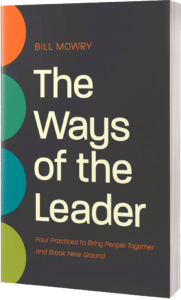Bill Mowry is a veteran staff member of The Navigators and author, currently serving with Navigators Church Ministries in Columbus, Ohio, with his wife, Peggy. We recently talked with Bill about his most recent book, The Ways of the Leader which unpacks four competencies for how to be an everyday leader in churches, communities, businesses, and more.

What prompted you to write a book on leadership?
One of the visions in my life is how do we deprofessionalize and uncomplicate disciplemaking, so the everyday Christian feels like it is something they can do. How do you make it relational, intentional, and thoughtful? Those were the themes that drove my previous books on disciplemaking — being committed to the everyday person.
So those same themes that I had for disciplemaking carried over into my thinking about leadership. How can everyday leaders lead others well in the context of where they are, in Godly and effective ways? How can people walk away and think, “God could use me as a leader right where I am with what I am doing.” I wanted to create a book about the lessons I’ve learned on leadership, particularly in a generation of wisdom, focusing on how to become an everyday leader. Someone who doesn’t have a lot of staff, money, or buildings, but who can feel empowered to lead others in their context.
When you talk about everyday heroes and leaders, what’s the difference between them and traditional leaders? Why do we need to lean more into everyday leaders?
Most of the time, books written about leadership are written by corporate or business leaders, people who are very successful and are often writing for others like themselves. We exalt CEOs or pastors of megachurches, and we put them on pedestals. And we can learn from them and the models they set for us.
However, a lot of times, they aren’t writing for the mid sized pastor, marketplace leader, or neighborhood activist who is just wanting to advance the gospel in their area. These are the everyday people, those that are leading in local, sometimes small, places, and they need just as much help and guidance. So I wanted to write for the everyday leader, helping him or her succeed in the leadership calling and challenges that they are facing on a local level.
What are the four qualities of wisdom gathering that your book discusses, and why did you choose them?
The first is being a lifelong learner, realizing that the classroom is always in session for me and my life in ministry, the workplace, and my neighborhood. With God as our teacher, we need to learn how to sit back and gather the wisdom he’s providing from our experiences.
The second is to be a collaborative leader, since there is wisdom in community and a group of believers. We need to ask ourselves how we can extract wisdom from our community and work together, realizing that we can’t do it by ourselves.
The third element is cultural wisdom. We are all placed in a context, a culture. In those cultures, there are certain values, languages, histories, and practices present, and we need wisdom on how to identify what those are.
Lastly, we need to be innovators, coming up with new approaches, resources, and strategies, and we need wisdom on how to do that. As an innovator, I can produce wisdom for the local leader to craft local solutions for local challenges.
If you could have readers take away one big point from your book, what would it be?
That God promises to give wisdom, but it might not be a quick fix solution. In my last chapter, I talk about choices we have to make to pursue wisdom. It’s often slow, like disciplemaking, and it takes a lot of hard work and thoughtfulness and searching Scripture or talking with people. So as a leader, I need to be willing to chase after wisdom, to give it the time and attention that it deserves. In the book, the four practices will not only help you apply wisdom, but they also help generate wisdom for you as a leader.
Discipleship Tip:
What does it mean to be an everyday leader? You can step up and lead others by seeking the Lord’s wisdom on how to serve and meet others’ needs in the communities and spaces you are already in. Pray and seek the counsel of other believers to find guidance on how you can lead others in new ways during your everyday life.
The Ways of the Leader

Want to learn more about how you can be an everyday leader? Read the first chapter of Bill’s book, The Ways of the Leader, today.




Excellent thoughts Bill! Godspeed!
Thank you for the free first chapter. I am looking to learn from this book and grow as an everyday leader
Thanks for sharing this. I am looking into using this with our deacon body.